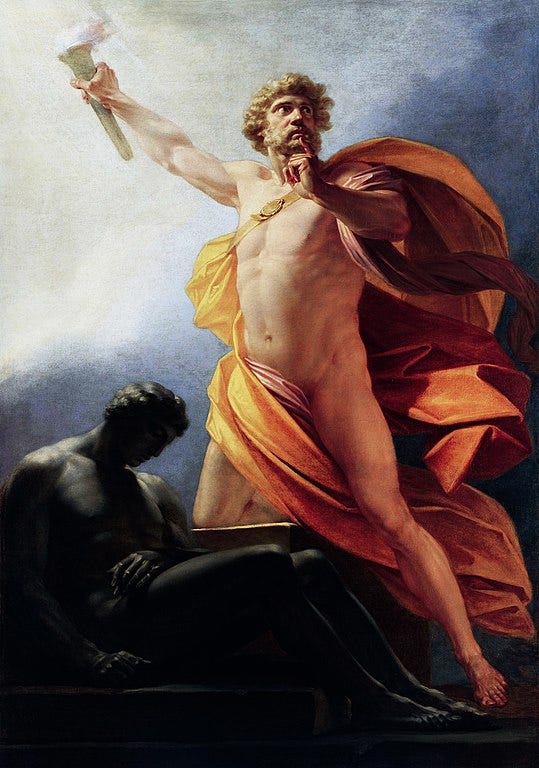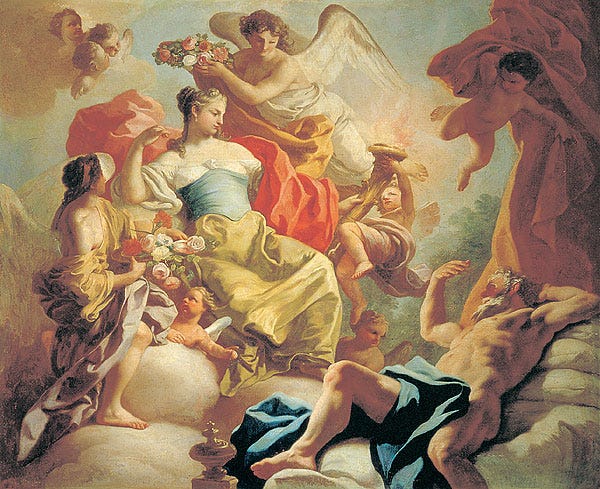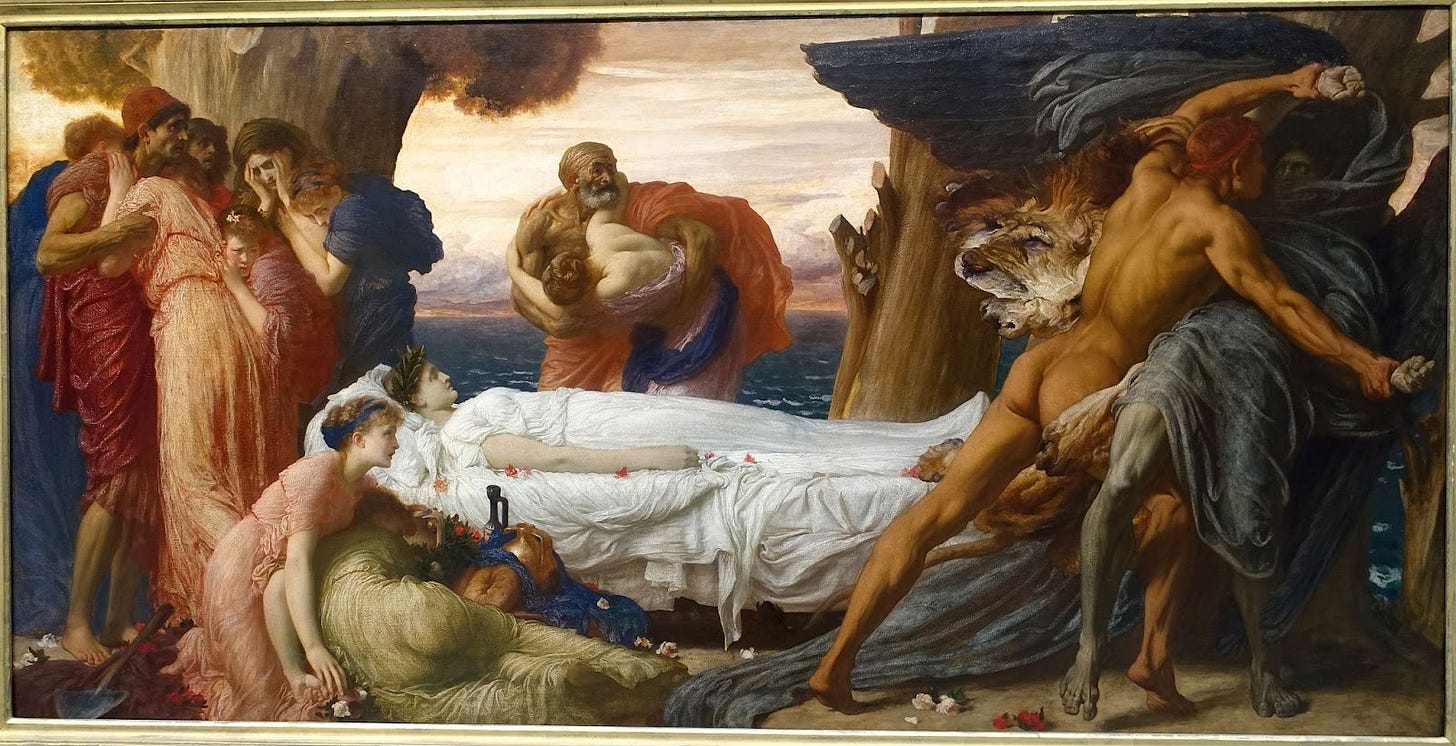Classical Transhumanism
The promises and perils of the posthuman world revealed through myth
For now, human organisms rule the earth. Tomorrow, human cyborgs may order the world. Further in the future, the citizens of the cosmos may not be human at all.
There are many reasons to think that our descendants will not be of our species. Such an age would be transhuman, posthuman, or superhuman.
Each of these words – I’ll use them interchangeably – describes a “philosophy and a project of technological transcendence that aims to make us more than human.”
The transhuman is someone who has at least one ability that vastly exceeds those of biological humans. In his paper “Why I want to be a posthuman when I grow up,” Nick Bostrom describes a posthuman as a being who lives much longer than a human, experiences the world more deeply, or is incomprehensibly smarter. The posthuman is to an ordinary human as an adult human is to a toddler or chimp.
Almost all of us have begun to merge with technology already. Humans have used physical prostheses for thousands of years. We fashion artificial limbs to stay mobile longer, use horses and cars to move around faster, and offload our thinking to machines daily. Neuroprostheses, nascent today, shall follow. Spinal cord stimulators manage pain through electrical impulses. Cochlear implants improve hearing by channeling electrical energy to auditory nerves. The Argus II retinal prosthesis restores vision and even made it past the barriers of the FDA, although its builders recently abandoned it to avoid bankruptcy. The project to improve the quality of life and stave off the effects of senescence through technology continues.
At this rate, advances in biology and computing suggest that we, or more likely our descendants, will eventually surpass human limits.
The posthuman world is close enough that it’s worth thinking about how valuable (or not) such a world would be. Our societies still have some role to play as to how it will (or will not) come about. One way to approach these issues is through argument. Taking such a route is necessary, but also important is thinking about such matters through narrative and myth. This piece will take the latter path, considering a plurality of tales, ancient and new.
Transhumanist Eschatology
Transhumanism has a eschatological character. It offers the promise of a nearly salvific future.
Ordinary life as a posthuman would constantly eclipse our best moments. Nick Bostrom imagines a Letter from Utopia where the author, call him the Utopian, writes to us:
My mind is wide and deep. I have read all your libraries, in the blink of an eye. I have experienced human life in many forms and places… You could say I am happy, that I feel good. That I feel surpassing bliss and delight. Yes, but these are words to describe human experience. They are like arrows shot at the moon. What I feel is as far beyond feelings as what I think is beyond thoughts. Oh, I wish I could show you what I have in mind! If I could but share one second with you!
Many of us have had euphoric moments where we feel like we’ve transformed – a moment that causes us to think “All of my life I have been sleeping, now I am awake.” At these moments, our experiences, actions, and intentions unify into a perfection that is difficult to describe. This state could be our whole life, a life where we have woken up, which is to say, a life where we have become enlightened. This is an eschatological arrival.
The destination, when described like this, must be good.
But the posthuman story is not an unstoppable triumphalist narrative.
Attaining a techno-utopia will not be a painless ordeal. The myth is not Panglossian. A substantial portion of human civilization may be left behind in the transition to superhumanity. Livelihoods and communities will be rendered unviable. There’s something to the oft-reported grief and anxiety of seeing one’s nation’s culture evolve to the point where it feels like it’s no longer “one’s own.” A transhuman world will eclipse the human one and those who remain human will find themselves in an earth that is no longer their own.
More importantly, no eschatology is complete without apocalypse. The future is a contingent matter – to attain bliss we must proceed through the time of perils. The technologies that enable utopia can also annihilate the possibility of it.
An unaligned superintelligent AI may come to dominate the world and erase everything of value instead of helping the human quest. An engineered bioweapon with an unforgiving mortality rate and unstoppable virality could end civilization as we know it. Worse than eliminating all life, future disasters could bring about suffering on a scale that exceeds all the suffering that has occurred in history so far. One could say that no salvation story is complete without the threat of hell.
Radical innovation, whether in bits or biology, carries the chance of both transcendence and perdition.
And yet, despite the risks, the transhuman arc bends toward utopia. Transhumanists paint their world in a mixed, but positive light. After all, in this view, nature’s cruelty, indignities, and stupidities can be annihilated. It is a world where, in the words of the Utopian, society is:
A never-finished tapestry, its weavers equal to its threads; the unfolding patterns a mesh for life and adventure, an inexhaustible generator of beauty.
This is an entirely eschatological story. The unveiling has begun and the human species must decide to transcend itself or remain in mediocrity.
Promethean Fates
In 1923, John Haldane wrote:
The chemical or physical inventor is always a Prometheus. There is no great invention, from fire to flying, which has not been hailed as an insult to some god. But if every physical and chemical invention is a blasphemy, every biological invention is a perversion. There is hardly one which, on first being brought to the notice of an observer from any nation which has not previously heard of their existence, would not appear to him as indecent and unnatural.
Prometheus stole divine fire from heaven for the sake of humanity. This was a violation of Zeus’s command. For this act, he was punished. Each day, an Eagle consumed his liver. Each night, it regenerated.
Prometheus can be seen as a sacrificial hero. He sacrificed himself for the good of humanity – by stealing fire and giving it to humanity, he gave us the ability to engineer a better world.
He can also be seen as a warning. In Medical Nemesis, the philosopher Ivan Illich tells the story as follows:
Driven by radical greed, he trespassed beyond the limits of man and in unbounded presumption stole fire from heaven…He thus inevitably brought Nemesis on himself. His hopeless and unending suffering turned the hero into an immortal reminder of inescapable cosmic retaliation.
In ancient myths, challenging nature and the gods is a symptom of vice. Yet if transhumanism is anything, it is such a challenge.
The transhuman story sees nature as fundamentally defective. Our bodies are beautiful but are also fragile, silly, and broken things. Our minds are capable of wonders from games, art, humor, and philosophy, but are relatively stupid in the space of all possible minds. Our lives are sublime, but also boring, tragic, and terrible. Nature is responsible for a world where mothers and children consume other mothers and children. These horrors and indignities are not the result of an intentional act of Adam, but a consequence of indifferent evolutionary processes.
Understood this way, the project of realizing superhumanity is fundamentally a rebellion against nature. A project against biological, cognitive, and experiential limits.
In myth, such insurrections rarely end well. Consider the war against death. The Utopian says “Any death prior to the heat death of the universe is premature if your life is good.” But mortals who strove for eternal life were punished. Individuals who pushed against aging and Thanatos displayed vice, not heroism.
Tantalus stole divine nectar – the substance which gave the gods immortality. For this, and more morbid crimes, he was punished to forever stand in a pool of water, shaded by a tree that was thick with fruit. Whenever he goes for water, the water recedes. Whenever he reaches for fruit, the branches withdraw. He cannot be satiated.
Thetis sought eternal life for her son Achilles. She was told to dip him into an enchanted pot. She did so, but not fully. Thetis exposed Achilles’ heel, guaranteeing a pathetic and ignoble end to a glorious life. Death by the hand of a greater man or peer on the battlefield bestows glory. Consider Sarpedon’s death at the hand of Patroclus and Patrocolus’s death at the hands of Hector. But instead of ending his life nobly, Achilles falls to an arrow delivered by Paris – someone who could not hope to be a peer to the greatest of the Greeks.
The goddess Eos fell for the mortal Tithonus. Unfortunately, Tithonus was a man and all men are mortal. The prospect of Tithonous’s death was something Eos could not bear. Hence, she implored that Zeus give her lover eternal life. Zeus does as she requests, but like an unaligned artificial intelligence, he grants Eos’s ask without understanding it. Tithonus does live forever, but his body and mind decay. In the end, Eos places her senile former lover in a private chamber. There he sits, bereft of the ability to move or form a coherent thought.
There are many such tales of this nature from antiquity. The myths of Sisyphus, of King Pelias, or of Orpheus, and Euridice are additional examples.
Such stories warn against seeking eternal life in particular and against challenging the limits of nature in general. Death cannot be surpassed. Attempts to prolong life can make it worse. Similar lessons apply to other limits. There are fates worse than death.
What is the key sin of the transhumanist narrative that these myths reveal?
Heraclean Decisions
Transhumanism is often criticized because it desecrates human nature. The thought is that changing biological human beings into other things is impermissible – even if such a transition results in happier, longer, and richer lives. It’s debatable whether human nature is accurately described in these critiques or, even if it is, it’s something we should care about. Regardless, reading the myths as bioconservative seems like a mistake. The ubiquity of metamorphosis in Greek myth suggests that the idea of transforming into other beings is not what’s wrong with transhumanism. Gods transforming into animals or humans is commonplace. That fact and the omnipresence of proto-superhumans, the demigod heroes, also suggests that there’s nothing intrinsically wrong with radically extending human capabilities.
Instead, the key problems of the transhumanist narrative that these myths propose are:
Challenging nature and the gods
Trading off what matters in an obsession to prevent the inevitable
I do not think there is anything wrong with the first. To that extent, I am with Prometheus. Nature is malleable and not at all perfect. Zeus has his admirable traits, but he is also shallow, cruel, and arbitrary. The same can be said of the natural state of things.
The second is more challenging to think through.
Ivan Illich once stated that instead of seeking better national health policies, citizens should steel themselves and embrace the following truths:
We will never eliminate pain
We will not cure all disorders
We will certainly die
Tantalus, Thetis, and Eos each denied what they had for the chance of escaping the inevitable. Tantalus was graced with the opportunity to dine with Gods and wasted it by greedily stealing from them (amongst other things). Thetis and Eos both wished to eliminate the chance of death for mortals. In doing so, Thetis prevented Achilles from dying a glorious death and Eos condemned Tithonus to drooling decline.
Instead of seeking to prolong health, extend intelligence, and experience the world more deeply, the classical attitude brings the focus back, always back, to character. At times, one worries that the transhumanists are only basing their judgments on compressed optimization procedures. More life, intelligence, and experience do not guarantee a better world. Arguably such things are without value when compared with virtue.
Though the argument for a future superhumanism is compelling, each of Illich’s tenets seems true for the foreseeable future. Eschatological visions of a different world ring of fantasy.
Of course, the transhumanist doesn’t need to deny this. Applied here, Illich’s point is technically all-or-nothing thinking. What matters is alleviating suffering and living well, not eliminating pain and living perfectly. However, internalizing the thought suggests that aiming to be anything more than a primitive transhumanist is hubristic. Today, apart from speculative bets, superhumanism is barely practical.
Transhumanism should be seen as less of an eschatological myth and more a matter of modest, incremental improvements. It’s not the Promethean quest that delivers purpose, but the Heraclean one. Society and individuals are always arriving at Heraclean forks – places where they must decide who to be – and ideally the virtuous path is taken.
Where exactly does the notion of virtue play a role? Virtue is an abstract notion where it’s essential to be specific and concrete. These issues warrant precise examples and careful argumentation, but here it is better to end with a story.
There is one other classical myth concerning the afterlife, that of Admetus and Alcestis. For a story concerning human immortality, it has an unusually happy ending.
Admetus is a favorite of Apollo. Seeing that Admetus is to die, Apollo requests that the fates prolong his life. They agree, but only on the condition that Admetus finds another to die in his place. He cannot. So, it looks like he is destined for the grave. His wife, Alcestis learns this and consents to take his place. She dies.
And Admetus is left to live alone. Without Alcestis, his house loses its color and worth.
So things are until Heracles arrives in Admetus’s kingdom.
Heracles eats and drinks with abandon, ignorant of the recent tragedy until he is scolded by a servant who can take his buffoonery no longer. Grateful for his host's hospitality and ashamed of his behavior, Heracles decides to make a hero’s amends. He travels to the underworld, wrestles Thanatos, and returns Alcestis to the land of the living.
There are two relevant ideas here.
The first is properly Stoic and classical. Do not trade off the good, for the merely indifferent. Admetus’s quest to find a substitute for his death is desperate. Apollo erred in the same way Eos did. There’s a reading of the tale where Alcestis has less than virtuous motivations.
The second is perhaps more mystical. The story of Admetus and Alcestis is one of the few ancient myths where humans are allowed to defeat death without tragic consequences. Such an act required a mortal to display the simple virtue of hospitality, a demigod hero to undergo what no mere human could do alone, and the sacrificial death of Alcestis. Perhaps it is only through death that one can surpass it.






I think it is a mistake to assume we can learn much about transhumanism from myth. The ancient Greeks had no magical source of knowledge. The myths do contain info about human nature, but lots of places contain that info, so if you must look to the myths, that is more likely a historical chance.
I think this sentence summarises well what I think the bad/evil side of transhumanism is: "Trading off what matters in an obsession to prevent the inevitable." (Many such cases in recent globalist society).
I feel transhumanism is based on the fear of death and an idea, but not experiential knowledge of, what connection with the divine is.
Nick Bostrom's quote, for example, seems to _try_ to explain a transhumanist lived experience. But all he is saying there feels like part of an awakening/ego death moment (in my experience). It's as if he is pursuing enlightenment, but thinks it comes from without (transhumanism and seperate) vs from within (divine and connected). (I'm not necessarily speaking in metaphysical terms here btw.)
Anyway, cool post, keep it up!